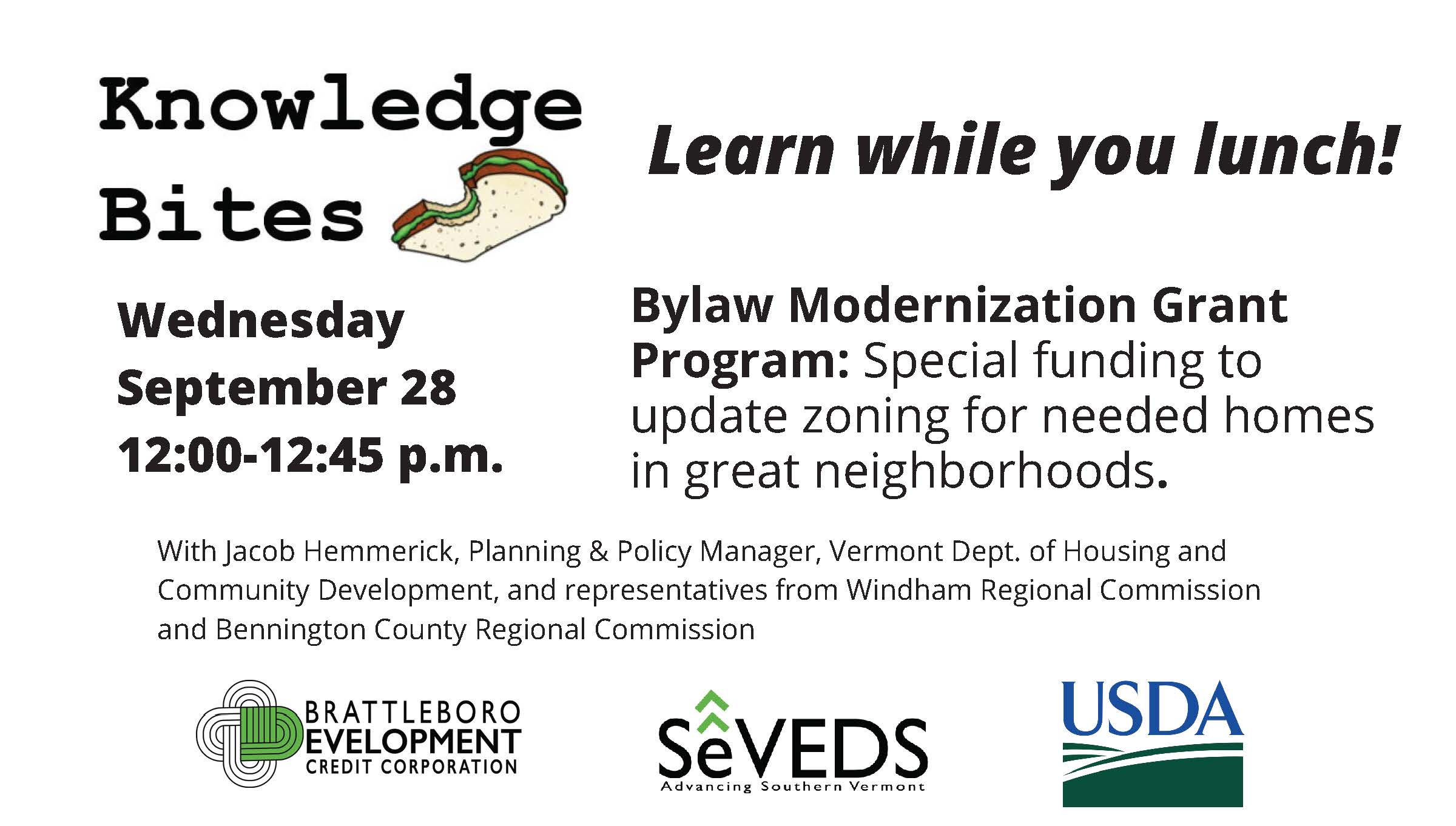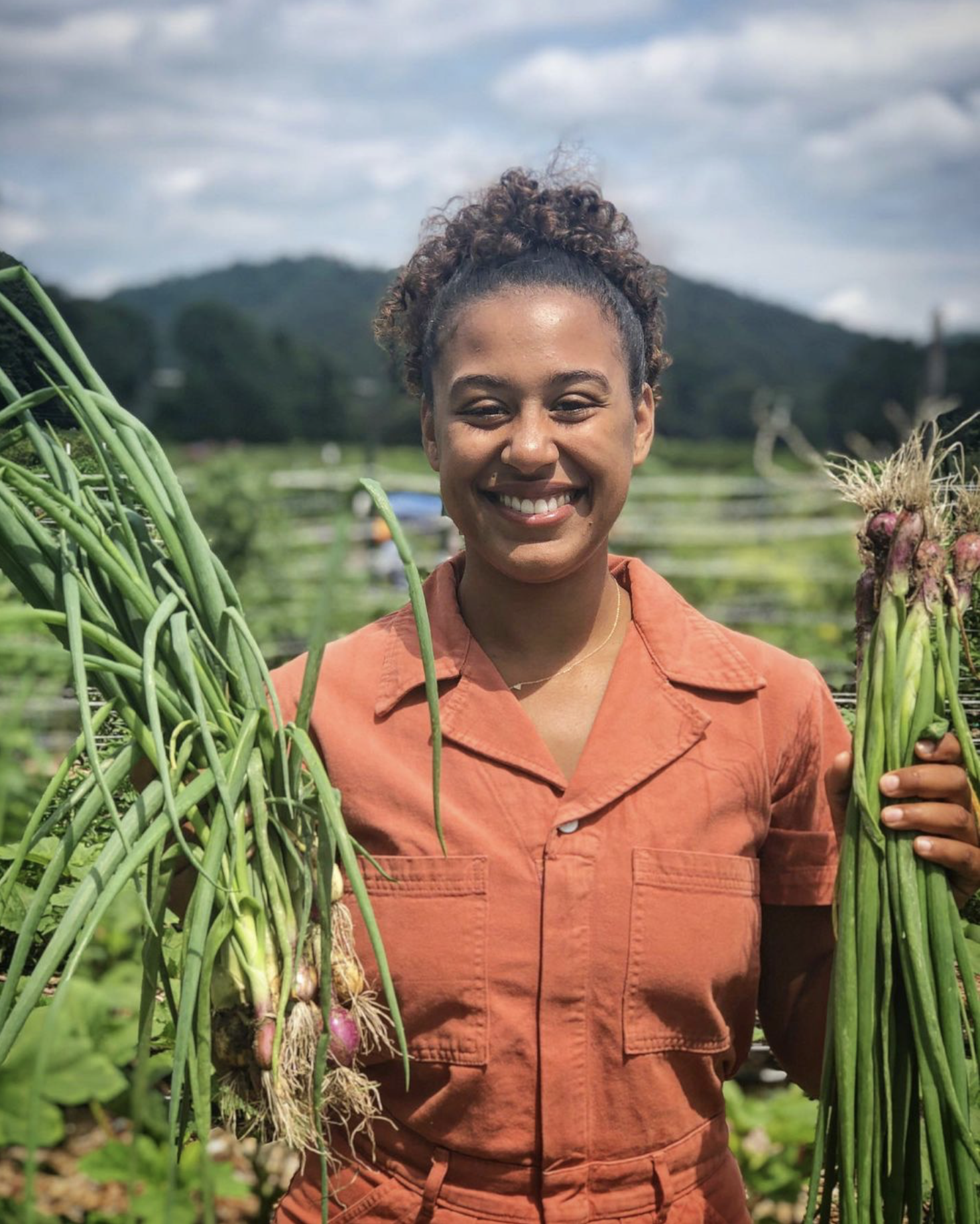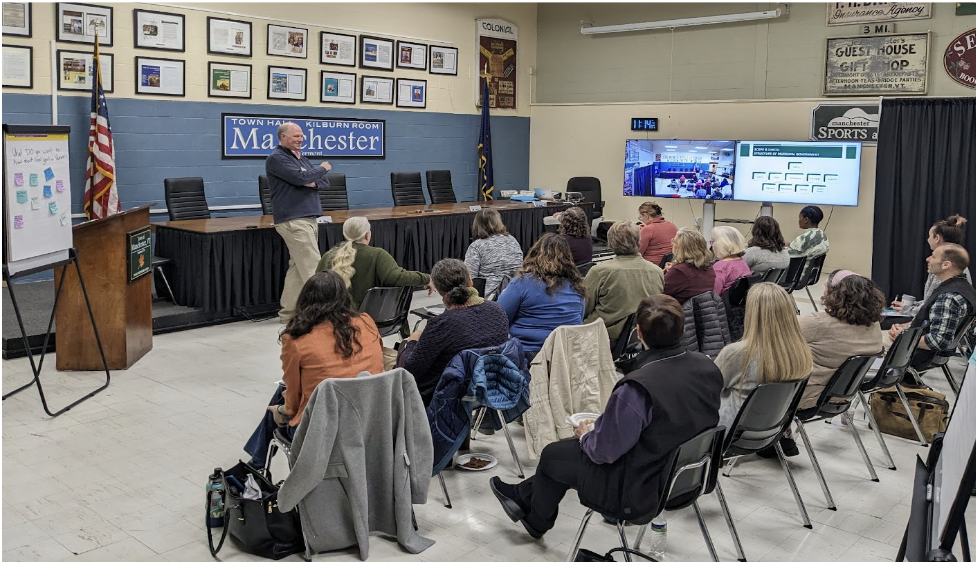
Learning and thinking about Vermont’s Local Government: the SoVT Get on Board program continues
“In larger communities and other places in the country… we tend to think of government as this sort of vending machine where it’s like – you put your tax dollars in there, and the services come out here, and if it doesn’t work, you kick it! In Vermont I think we understand that it’s more like a garden. You’ve got to show up, and there’s going to be bugs, and you have to stay with it, and keep coming back, and do it with a little bit of love and care.” – Susan Clark, presenting at SoVT Get on Board Unit 2: Local Government in Vermont
Do you need special qualifications to serve in local government? What relationship does the Town Clerk have with the Select Board? Who does the Town Administrator report to? Who creates policies for fire and police departments in Vermont’s local municipalities? What courses do board members take after being elected or joining local government? (*Find the answers at the end of this post!)
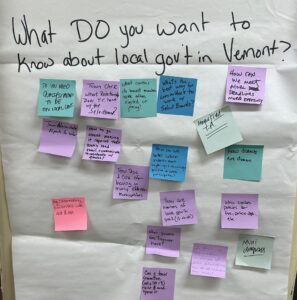
Questions posted by the SoVT get on Board class for Ted Brady
These are all questions that attendees of the SoVT Get on Board program brought to the Manchester Town Office on Saturday, November 4, for a day devoted to learning about Vermont’s local government.
In the morning session, “Everything You Wanted to Know About Vermont’s Local Government (but were afraid to ask),” Ted Brady, Executive Director of the Vermont League of Cities and Towns, answered many of the participants’ questions. From delving into some of the interesting peculiarities of Vermont’s local government structure to exploring the various types of entities that are considered municipalities in Vermont (including utility districts, villages, fire districts, and communications union districts), and exploring the source of a Select Board’s power (answer: the legislature), the group gained a better understanding of why their town functions the way it does.
In the afternoon session, participants heard from Rey Garofano and Susan Clark, representatives of the Creative Discourse Group. CDG employs a group of skilled facilitators who lead conversations about equity, inclusion, and democracy in Vermont.
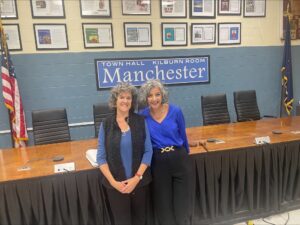
Susan Clark (left) and Rey Garofano at the Manchester Town Office on November 4, 2024
Rey encouraged leaders and citizens to cultivate an ongoing awareness of who is making decisions, who benefits from those decisions, and who might be missing from any given discussion or decision. As an immigrant who was raised in a low income family, but now serves as a representative in our state legislature (Chittenden-23), she stressed the importance of maintaining awareness of people in the community who need to be heard, and of not only asking those people to speak up, but also supporting them as they do so. She shared practical tips for identifying potential leaders in your community (she keeps a spreadsheet!) and shared ways to ask people to contribute when opportunities arise, noting that it is often necessary to ask several times, or have several people ask the same person.
Following Rey, Susan Clark led a session on navigating polarities. The exercise helped participants realize how important it is to look at both sides of complex and divisive issues. By evaluating opposing viewpoints and understanding the strengths and weaknesses of both, we make room for arriving at ‘both/and’ solutions to the complex situations our communities often face. Rather than thinking about ‘giving up’ to the opposing side, this way of thinking allows us to step away from ‘either/or’ solutions towards a more enduring solution that honors and includes the best parts of both positions.
As an example of exploring a typical community debate which is at its heart about continuity and change, participants workshopped a hypothetical question of whether to preserve a Town Hall or build a new structure for community use. Looking at the issue from all sides cleared the way for a solution that honored tradition while making a building that served the community needs and budget. (For example: making a new building, but incorporating important architectural elements of the old building into it; building an addition instead of an entire new building if the site allowed, and so on). Best of all, it did so by incorporating opposing viewpoints rather than diminishing them.
The SoVT Get on Board Class, a program of Brattleboro Development Credit Corporation’s Southern Vermont Economy Project, continues until January 6. Funding for SoVT Get on Board comes in part from the Vermont Community Foundation.
*Answers to participant questions in opening: Residents do NOT need any special qualifications to serve; the Clerk and the Select Board have equal amounts of authority in the structure of local government and the Select Board cannot tell the Clerk what to do; the Town Administrator generally reports to, and is hired by, the Select Board (this includes Town Managers, who are their town’s chief administrators); municipalities are not required to create policies around or fund fire and police departments in their town (although they can decide to do so, or be granted this responsibility by a municipal charter, which is approved by the legislature); VLCT has a full range of training courses for elected and appointed municipal officials, although none are required.
About the Brattleboro Development Credit Corporation:
The Brattleboro Development Credit Corporation (BDCC) is a private, nonprofit economic development organization with the mission of investing in the drivers of the regional economy so that people, businesses, and communities in Southern Vermont can thrive. BDCC serves as the State of Vermont’s certified Regional Development Corporation (RDC) for the greater Windham County area (including Windham County and the towns of Readsboro, Searsburg, Winhall and Weston). BDCC is one of 12 RDCs throughout Vermont. BDCC activity is made possible in part by a grant from the State of Vermont through the Agency of Commerce and Community Development. For more information visit: https://brattleborodevelopment.com/
About the Southern Vermont Economy Project (SVEP):
The Brattleboro Development Credit Corporation’s Southern Vermont Economy Project provides training and technical assistance to increase local capacity, skills, and resources in order to advance local projects critical to Southern Vermont achieving community, economic, and workforce development goals. SVEP is funded through the USDA Rural Community VDevelopment Initiative. For more information please visit: https://brattleborodevelopment.com/svep/


